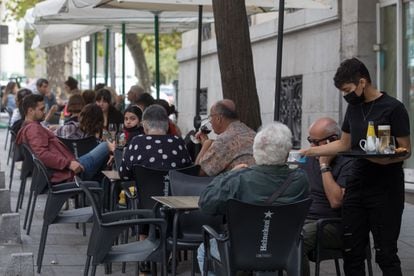/cloudfront-eu-central-1.images.arcpublishing.com/prisa/2R4U5CB5HLI2SOSPB6N2WG5V2E.jpg)
[ad_1]
Starting Monday, October 4, there will be no capacity restrictions on any food or entertainment venue in the Madrid region. The new measure will apply to bars, restaurants, nightclubs, cinemas, theaters, multi-use spaces and sports centers. Madrid premier Isabel Díaz Ayuso, of the conservative Popular Party (PP), made the announcement Wednesday night during an interview with Spanish TV network Telecinco.
“Starting Monday, we are going to get rid of all the restrictions on capacity and we are practically a step away from how it was before the pandemic,” she said from Washington, where she is on an institutional visit.
We are a region that fortunately has been able to combine what’s most important, which is health, with the health of the economy
Madrid premier Isabel Díaz Ayuso
Since September 20, there have been no coronavirus restrictions on the opening hours of these venues, but capacity has been limited to 75%. With respect to bars and restaurants, there has been a six-person limit on tables indoors and 10-person limit in outdoor spaces. These measures will remain in place until Monday. After that, food and entertainment venues will be able to open at full capacity, and there will be no restrictions on how many people are allowed to a table. Bar counter service will also be allowed as long as patrons are seated.
With respect to the use of face masks, Ayuso announced that the covering will no longer be required in outdoor spaces in restaurants if a safe distance can be maintained. A spokesperson from the Madrid health department confirmed that face masks will “continue [to be needed] indoors,” and that the rest of the details would be outlined by the weekend.
In the interview, Ayuso, without providing data, said her government’s handling of the coronavirus pandemic had placed Madrid in a “privileged position.” “We are a region that fortunately has been able to combine what’s most important, which is health, with the health of the economy,” she said, adding that the region was “an example to follow.” “Madrid is safe, open and a way of life,” she said.

Since the deescalation of Spain’s coronavirus confinement measures in the spring of 2020, Madrid has had the most relaxed restrictions of the country’s 17 regions – even when it had the highest incidence rate. Until it was outstripped by Catalonia during the fifth wave, Madrid consistently reported the largest number of detected coronavirus cases. Its healthcare system has also faced the most pressure: 125,506 Covid-19 patients have been hospitalized in Madrid since the beginning of the pandemic. Madrid has also reported the highest number of fatalities. According to the official count from the Health Ministry, 16,094 people in Madrid have died from Covid-19 – a figure the Madrid region puts at 25,321.
Ayuso’s announcement comes one day after the Spanish Health Ministry and the regions – which are responsible for their healthcare systems, the Covid-19 vaccination drive and restrictions – agreed to allow outdoor stadiums to open at full capacity from this weekend in view of the improved epidemiological situation. On Wednesday, the Spanish Health Ministry reported that the 14-day cumulative number of coronavirus cases per 100,000 inhabitants had dropped to 60 – the lowest figure since July 2020, when it was 57. Pressure on intensive care units (ICUs) also continues to ease, with Covid-19 patients occupying 8.07% of ICU beds, down from 8.47% on Tuesday.
As the epidemiological situation improves, several regions have announced plans to ease coronavirus restrictions on the hospitality sector. Authorities in Andalusia said that limits on capacity and opening hours will be lifted in half of the southern region on Friday. Catalonia announced that it is planning to reopen nightclubs once a Covid pass – showing whether the bearer is fully vaccinated, tested negative for Covid-19 or has recently had the virus – is introduced. And on Wednesday, the regional government in Extremadura also lifted all restrictions on opening hours and capacity in public establishments.
English version by Melissa Kitson.
[ad_2]
Source link